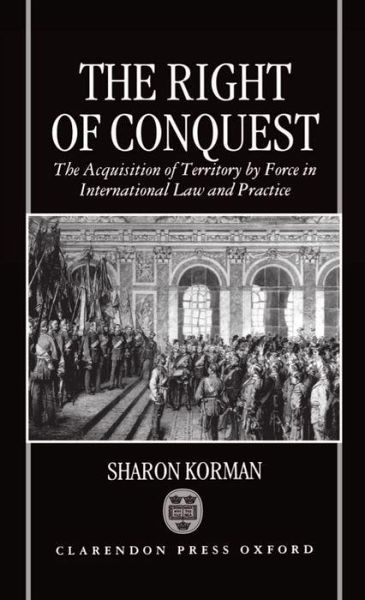
The Right of Conquest
The Acquisition of Territory by Force in International Law and Practice
Versandkostenfrei!
Versandfertig in 1-2 Wochen
239,99 €
inkl. MwSt.

PAYBACK Punkte
120 °P sammeln!
This is an enquiry into the place of the right of conquest in international relations since the early sixteenth century, and the causes and consequences of its demise in the twentieth century. It was a recognized principle of international law until the early years of this century that a state that emerges victorious in a war is entitled to claim sovereignty over territory which it has taken possession. Sharon Korman shows how the First World War - which led to the rise of self-determination and to calls for the prohibition of way - prompted the reconstruction of international law and the consequent abolition of the title by conquest. Her conclusion, which highlights the merits and defects of the modern law as a vehicle for discouraging war by denying the title to the conqueror, challenges many of the assumptions that have come to constitute part of the conventional wisdom of our times. This is a study, not of international law narrowly conceived, but of the place of a changing legal principle in international history and the contemporary world.
The notion that a state that emerges victorious in war is entitled to claim sovereignty over conquered territory in virtue of military victory or conquest was a recognized principle of international law until the early years of this century. This study is an enquiry into the place of the right of conquest in international relations since the early sixteenth century and the causes and consequences of its demise in the twentieth century. Part 1 examines the theoretical foundations of the right of conquest, its historical importance both in the establishment of the European colonial empires and in the relations between the European state themselves, and provides an analysis of the traditional law of conquest. Part 2 shows how the First World War, which led to the rise of the principle of self-determination and to calls for the prohibition of aggressive war, prompted the reconstruction of international law and the consequent rejection of the right of conquest. A number of case studies of the seizure of territory since 1945 - including East Jerusalem and the Golan Heights, Goa, the Falkland Islands, East Timor, and Kuwait - are used to evaluate the content and effectiveness of the modern law. Sharon Korman concludes by considering the merits and defects of the abolition of the right of conquest from the standpoints of international order and justice.












